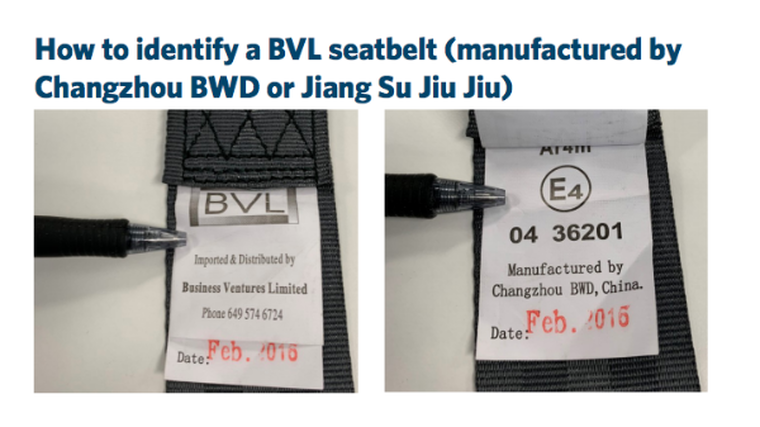Consumers alerted to faulty seatbelts

Trading Standards is reminding consumers and auto parts retailers to check for BVL seatbelts, which are unsafe and need to be immediately recalled.
Trading Standards has been working since November 2018 to locate consumers who may have purchased one or more of the estimated 16,000 belts imported by Business Venture Ltd (BVL).
Trading Standards understands these may have been onsold by various auto parts stores throughout New Zealand at any time since 2008.
BVL seatbelts are in use as replacements for damaged original seatbelts and were also used by modifiers who added seats and seatbelts to vehicles.
“We are urgently reminding consumers who own second-hand vehicles or who have had replacement seatbelts fitted, to check their seatbelt labels for these brands. If the label shows the BVL logo and/or manufacturers name Changzhou BWD or Jiang Su Jiu Jiu, they are advised to immediately contact BVL to have them replaced,” says Trading Standards team leader safety and technical Martin Rushton.
“This is also a reminder for any business which onsells products to keep a clear paper trail of their sales, so in the unlikely event of a serious product recall, the ability to identify and notify affected consumers and keep them safe is significantly increased.”
Trading Standards administers the recalls.govt.nz site, which lists all products recalled in New Zealand. At any one time, there are thousands of products being voluntarily recalled by their companies and brands, usually for small issues that can be easily remedied.
However, occasionally there are more serious recalls for problems which put consumer safety at risk, which is where the Trading Standards team takes action with the business behind the faulty product.
“In nearly every case of there being a product fault, the brand owner will do all it can to readily identify the problem, notify it, recall it and offer consumers a refund – it’s in their best interest for brand recognition to do it. However often there is a challenge in identifying and directly contacting all the customers who may have bought the product. This can be especially harder if the sales records are not clear or retained,” adds Rushton.
In the meantime, the NZTA has instructed vehicle inspectors to fail a vehicle for its warrant of fitness (WOF) or certificate of fitness (COF) inspection if these seatbelts imported by BVL are identified in a vehicle.
The agency's regulatory general manager Kane Patena says vehicle owners who have had, or may have had, seatbelts retrofitted should also check the labels for peace of mind, rather than wait for a WOF or COF check.
“This is an important safety issue. While the transport agency is not currently aware of any failures involving BVL imported seatbelts in New Zealand or overseas, the independent testing of the seatbelts we commissioned indicated that although the belts are labelled as compliant with European regulation, they are not compliant and do not meet minimum strength requirements," says Patena.
“Checking the labels for yourself only takes a few moments and could help keep you and your passengers safe."
To find out more and what to do, visit the recalls website here.
Only eight per cent of the 16,000 unsafe seatbelts have been traced
Talking to Stuff NZ, Rushton said that just eight per cent of the roughly 16,000 unsafe seatbelts had been traced.
According to Rushton, BVL the business is cooperating with the recall but tracing the seatbelts was not proving easy, and so far just over 1,200 had been traced.
New Zealand importers were not legally required to keep records of who they had sold their goods too, and the businesses which buy and on-sell them, didn't either, he told Stuff.
"In this case, BVL didn't have an obligation to keep any records, so there is no easy route to trace people," added Rushton.





